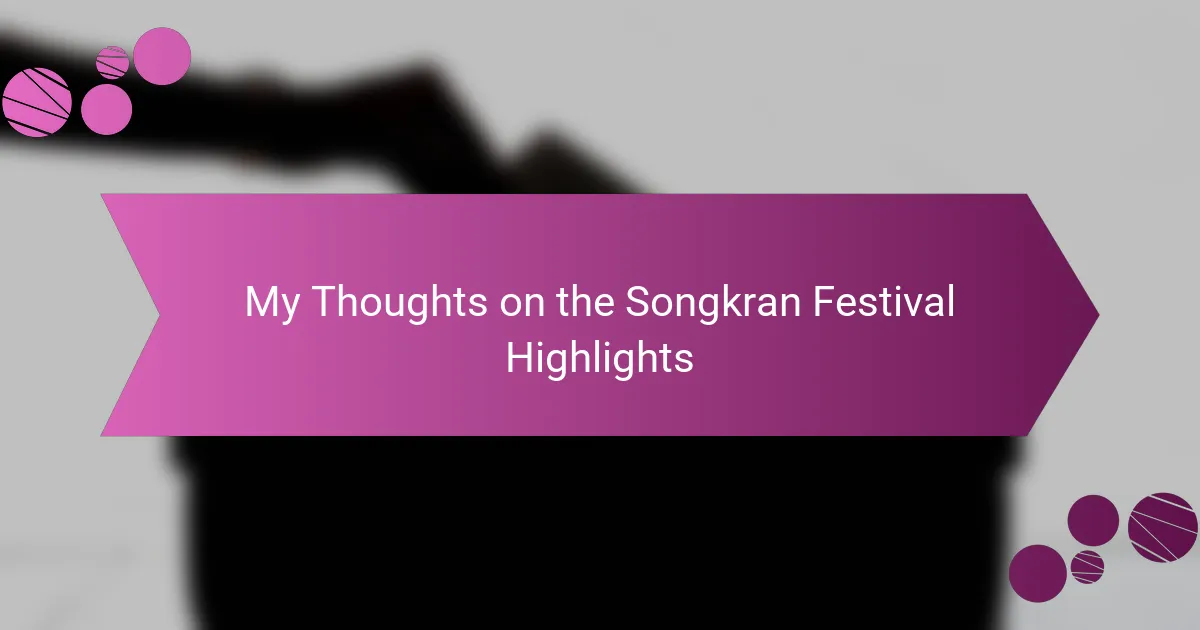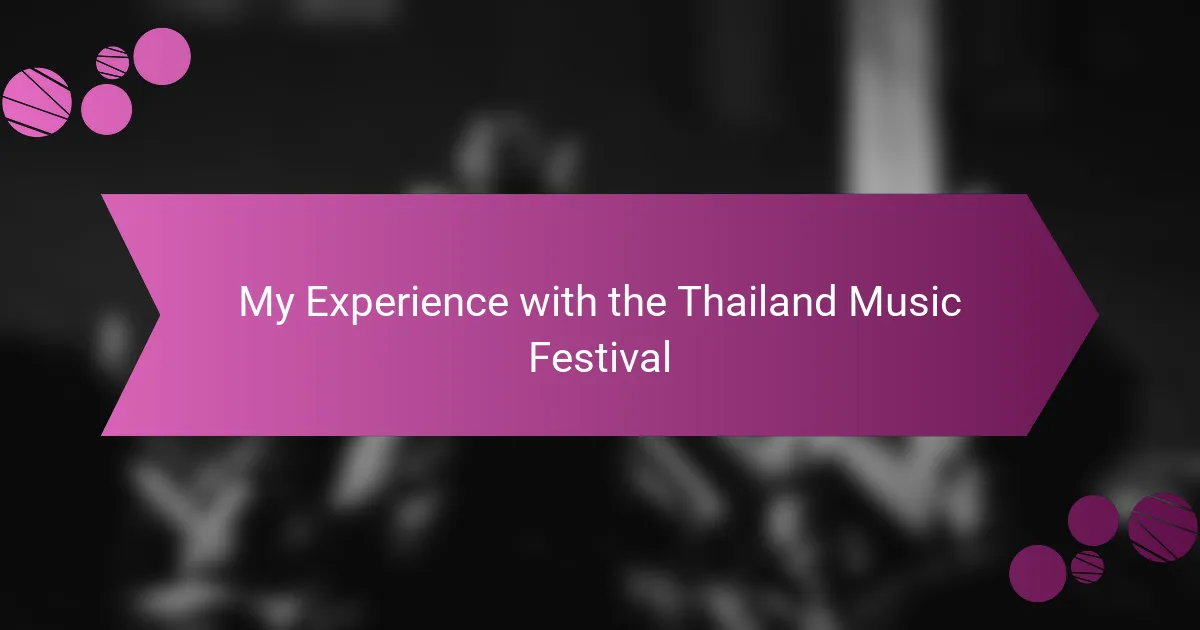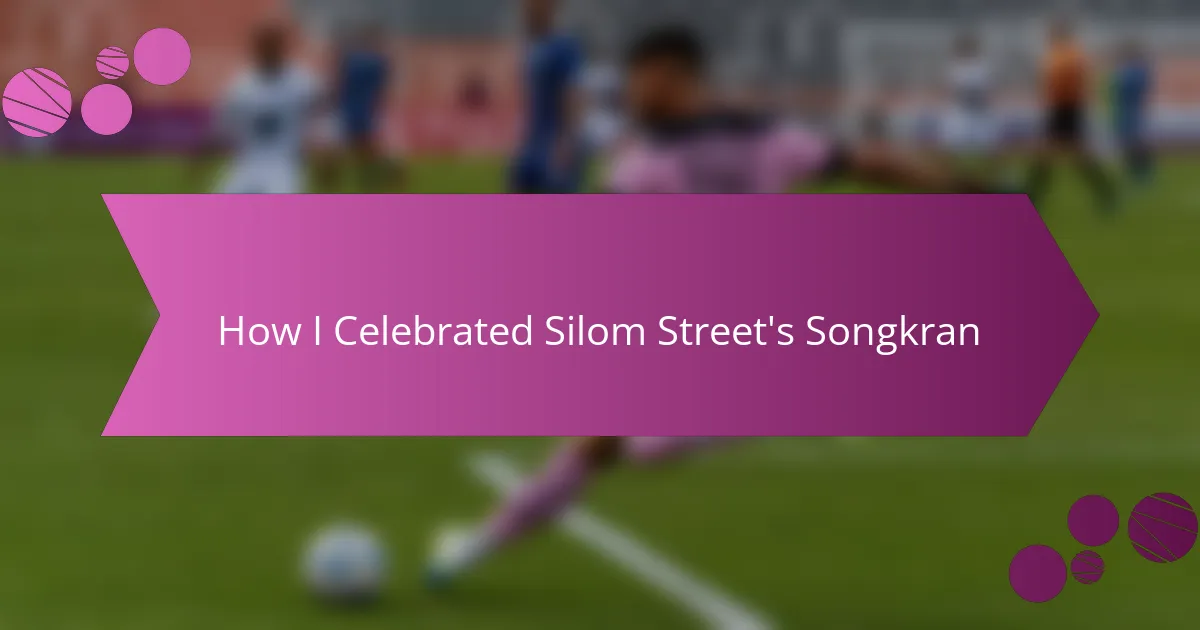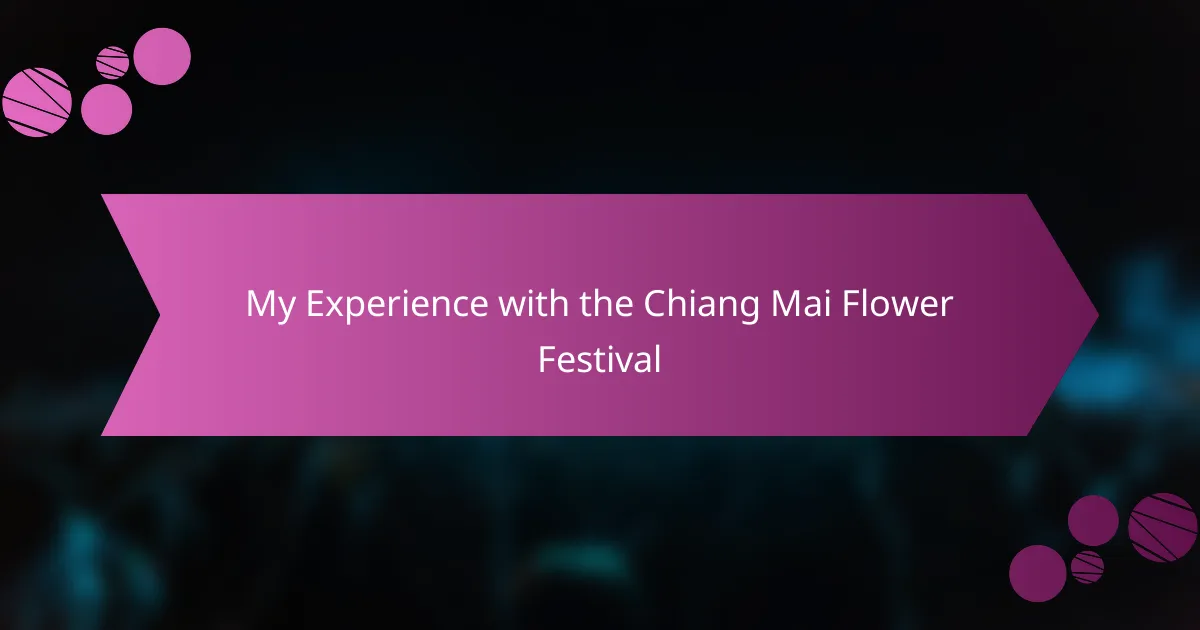Key takeaways
- Songkran Festival celebrates the Thai New Year with vibrant water fights, symbolizing purification and family reunions.
- The festival features a blend of traditional and contemporary music, enhancing communal joy and cultural expression.
- Cultural rituals during Songkran include visiting temples, giving alms to monks, and pouring water over elders, emphasizing respect and renewal.
- Performances at the festival showcase a mix of traditional dances and contemporary music, creating a lively atmosphere that resonates with all attendees.
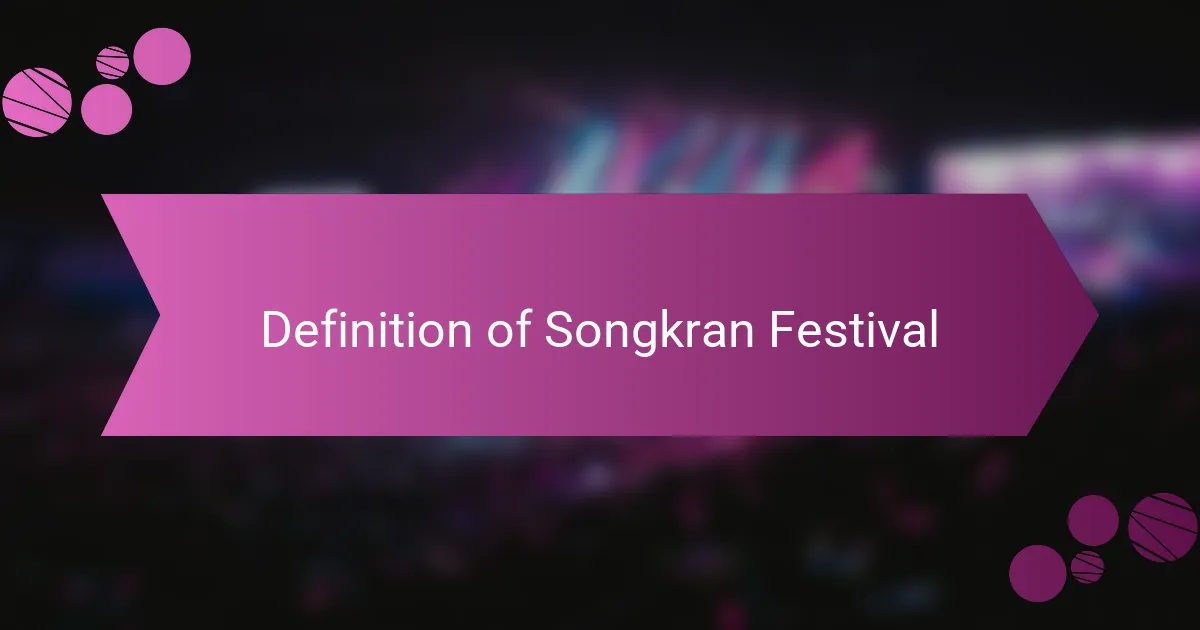
Definition of Songkran Festival
The Songkran Festival is celebrated annually in Thailand to mark the traditional New Year, which falls in mid-April. This vibrant and joyful festival is known for its lively water fights as people splash water on each other to symbolize purification and the washing away of sins. Personally, I cherish the joyous atmosphere during Songkran; it’s a unique blend of cultural significance and sheer fun that transforms the streets into a festive playground.
During this time, people also visit temples to make merit and spend quality time with their families, emphasizing respect and gratitude towards their ancestors. The festival beautifully reflects the essence of Thai culture, where happiness, unity, and cleansing rituals come together in a splash of excitement and color.
| Aspect | Description |
|---|---|
| Traditional Significance | Marks the Thai New Year and symbolizes purification. |
| Celebration Style | Includes water throwing and cultural rituals. |
| Duration | Typically lasts for three days, starting from April 13 to 15. |
| Key Activities | Visiting temples, family gatherings, and water parades. |
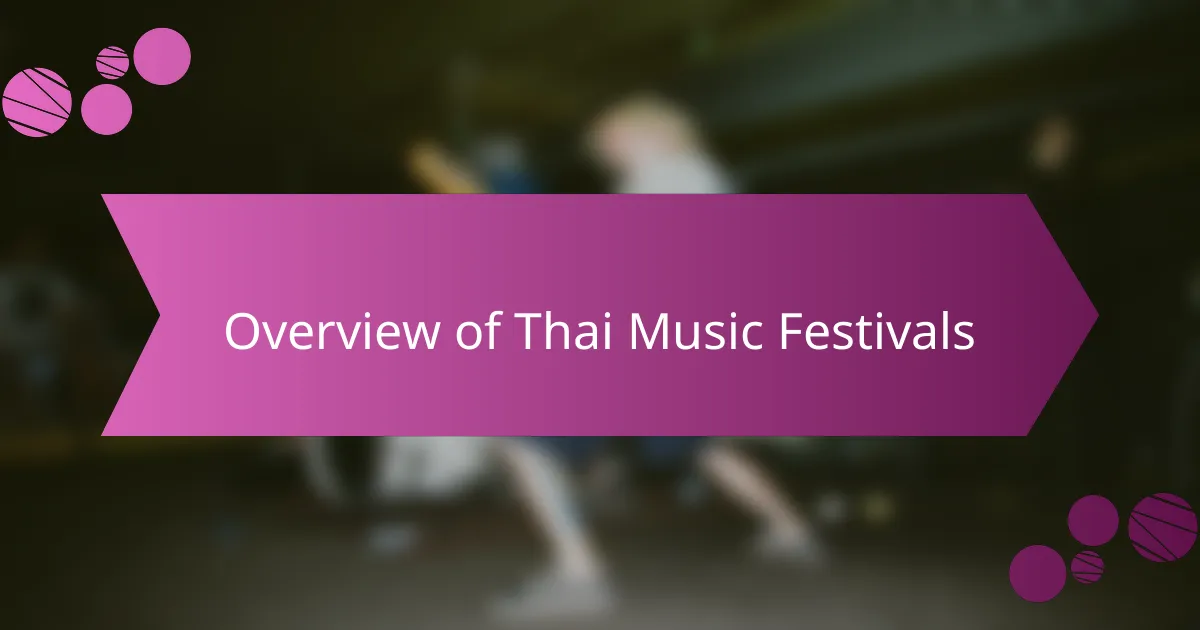
Overview of Thai Music Festivals
Thai music festivals are vibrant celebrations that blend traditional sounds with contemporary styles. They often reflect the rich cultural heritage of Thailand and showcase a variety of genres, from local folk music to modern pop and rock. My experiences at these festivals have been nothing short of exhilarating, as the energy in the atmosphere pulsates with joy and creativity.
While some festivals are rooted in age-old traditions, others embrace new trends, creating a unique mix that appeals to both locals and international visitors. One memory that stands out for me was at a festival where the crowd sang along to classic Thai hits, filling the air with nostalgia and a sense of community.
| Festival | Highlights |
|---|---|
| Songkran Festival | Water fights, cultural performances, traditional music |
| Chanthaburi Music Festival | Local artists, seafood markets, nature backdrop |
| Phi Ta Khon Festival | Colorful costumes, parades, traditional folk music |
| Surin Elephant Festival | Elephant parades, traditional khmer music, cultural shows |
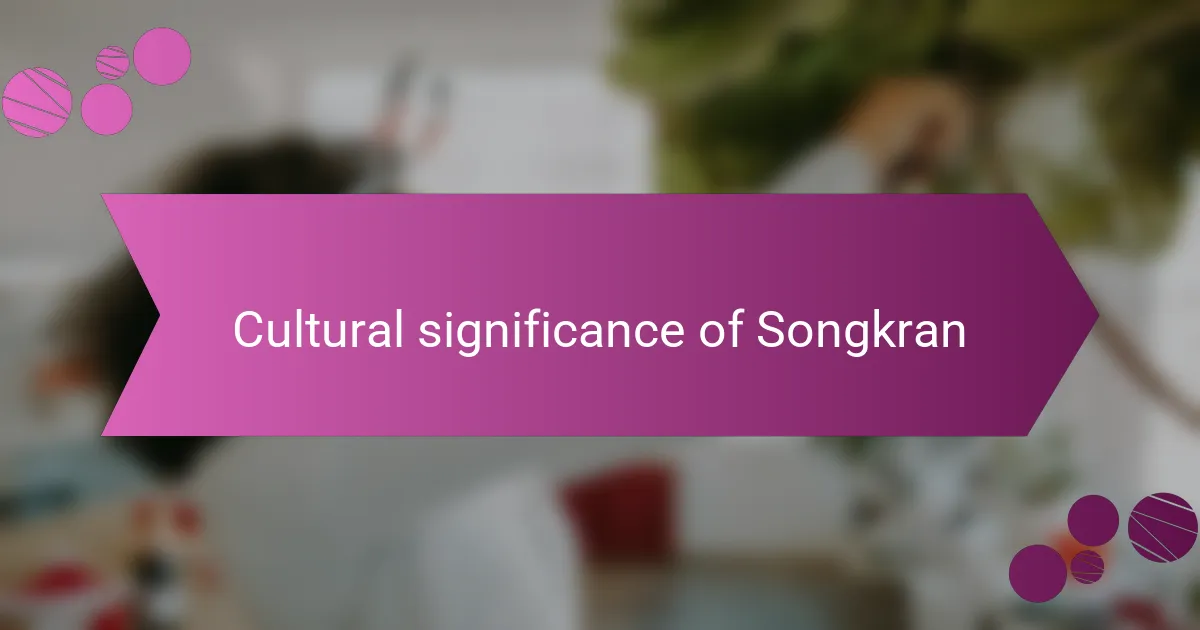
Cultural Significance of Songkran
The cultural significance of Songkran extends far beyond the exuberant water fights and festive celebrations that dominate the scene. For me, it’s a time when families reunite, paying respects to elders and participating in traditional rites, which truly highlights the importance of community and connection in Thai culture. I vividly remember the day I poured fragrant water over my grandmother’s hands, feeling both her warmth and the weight of our shared history—it was a profound moment that encapsulated the festival’s spirit.
Songkran serves as a rich tapestry of traditions, reminding us of our roots. Here are some essential cultural elements:
- Rituals of Respect: Pouring water over Buddha statues and elders symbolizes the washing away of misfortunes and the blessing of a fresh start.
- Family Reunions: Many people travel long distances to return to their hometowns, reinforcing bonds that matter most.
- Local Traditions: Different regions celebrate differently, showcasing local customs, festivals, and cuisine that are unique to each area.
- Ceremonial Offerings: Giving alms to monks is a common practice, emphasizing charity and appreciation for the monastic community.
- Symbol of Renewal: Overall, Songkran signifies the start of the new year and the hope for happiness and prosperity ahead.
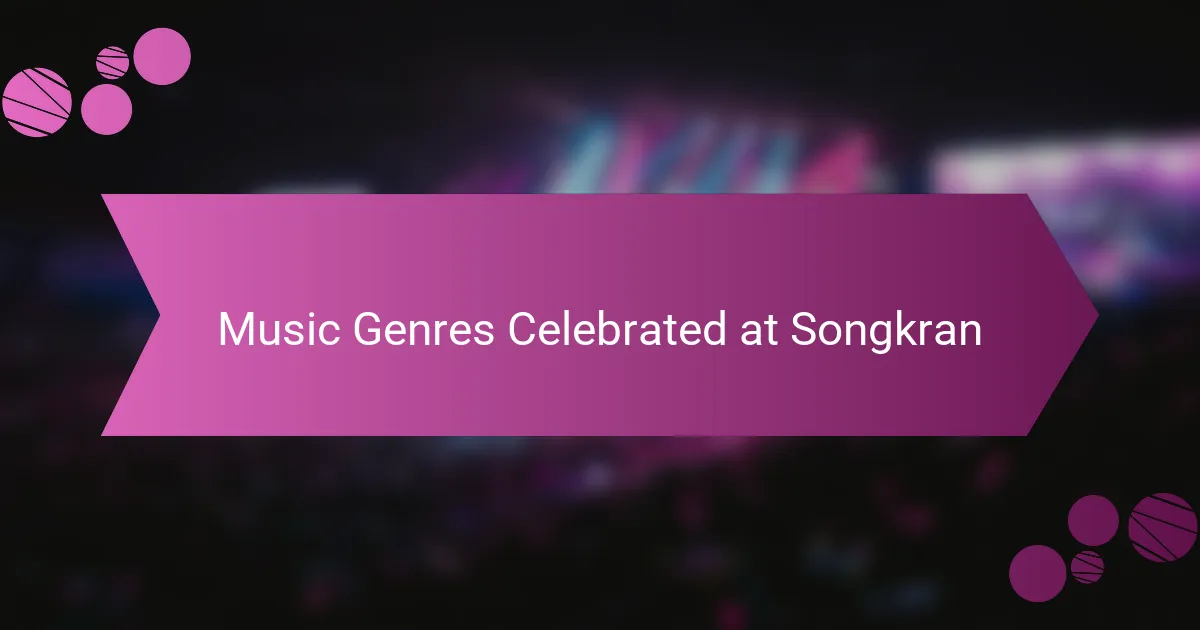
Music Genres Celebrated at Songkran
The Songkran Festival is a vibrant celebration that truly showcases a rich variety of music genres. From traditional Thai folk music, which stirs a sense of nostalgia and belonging, to contemporary pop and modern electronic beats, each genre adds a unique flavor to the festivities. I remember dancing to traditional Mor Lam music; it felt like a joyful connection to the past while surrounded by friends and family.
Moreover, the festival highlights the fusion of these genres. I’ve seen enthusiastic crowds sway to a remix of classic tunes blended with modern rhythms. It’s a beautiful reflection of how tradition and innovation can coexist, creating a lively atmosphere that resonates with everyone present.
| Music Genre | Description |
|---|---|
| Traditional Thai Folk | Rooted in Thai culture, evokes nostalgia and connection. |
| Contemporary Pop | Upbeat and relatable, commonly played at public celebrations. |
| Electronic Dance Music | Brings youthful energy, encouraging dance and mingling among diverse groups. |
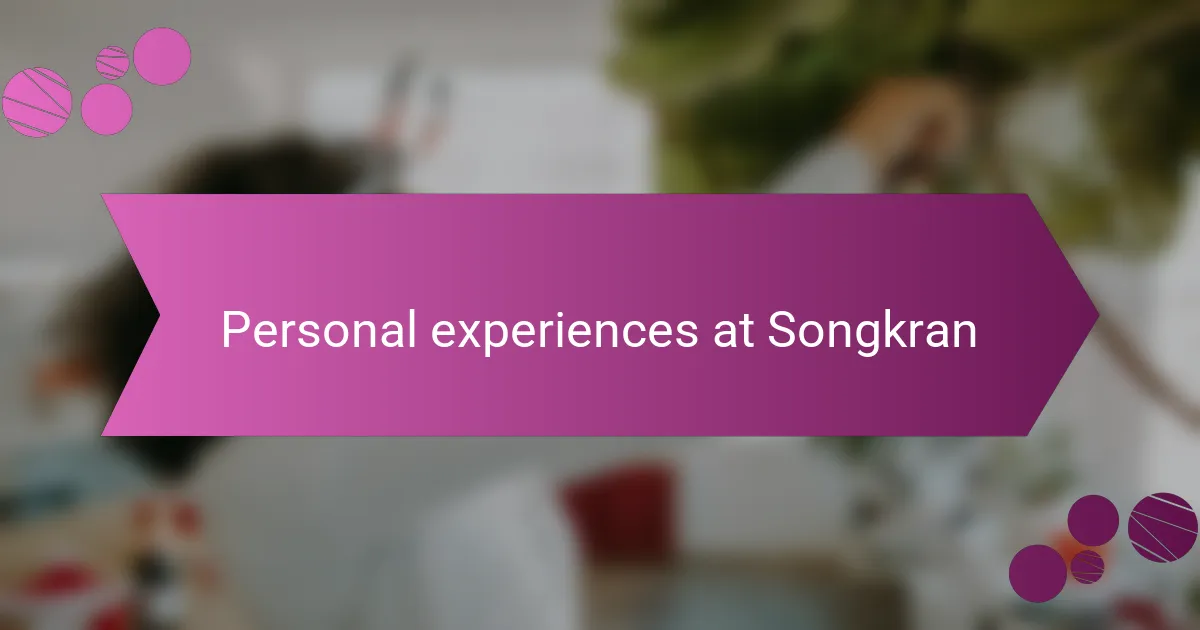
Personal Experiences at Songkran
During my visits to the Songkran Festival, the vibrant atmosphere always overwhelmed me in the best possible way. The joy of splashing water with strangers, combined with the upbeat sounds of traditional Thai music, felt both exhilarating and unifying. One year, I stood amidst a group of locals, and we bonded over laughter as we attempted to dodge water guns while trying to fill our buckets.
I remember the feeling of sheer joy as I danced with friends under the sun, water pouring down around us, perfectly capturing the spirit of renewal that Songkran embodies. That infectious energy is something I look forward to every year; it reminds me of the importance of community, culture, and celebration.
Here’s a comparison of different experiences at Songkran:
| Experience | Details |
|---|---|
| Splashing Water | A thrilling way to interact and bond with locals and tourists alike. |
| Traditional Music | Creates a lively atmosphere and enhances the communal spirit during the festival. |
| Cultural Events | Offers a deeper understanding of Thai traditions, often accompanied by delicious local food. |

Highlights of Popular Performances
The Songkran Festival truly shines when it comes to its vibrant performances. From traditional dancers showcasing intricate Thai classical dance to contemporary bands strumming lively tunes, there’s something for everyone. I remember soaking in the excitement last year when a local folk band played—everyone around me was dancing, and it felt like pure joy radiating through the air.
The fusion of modern and traditional elements is fascinating. I’ve seen artists blend traditional Thai instruments with contemporary rhythms, making the performances feel fresh and engaging. It’s a beautiful celebration of culture that resonates deeply with both locals and tourists alike, creating a shared sense of community.
Here’s a comparison table highlighting different types of performances you might encounter during the festival:
| Performance Type | Description |
|---|---|
| Traditional Dance | Intricate movements and costumes depicting Thai mythology. |
| Contemporary Music | Modern bands blending genres, often with upbeat vibes. |
| Folk Music | Local sounds that resonate with the community’s roots and stories. |
